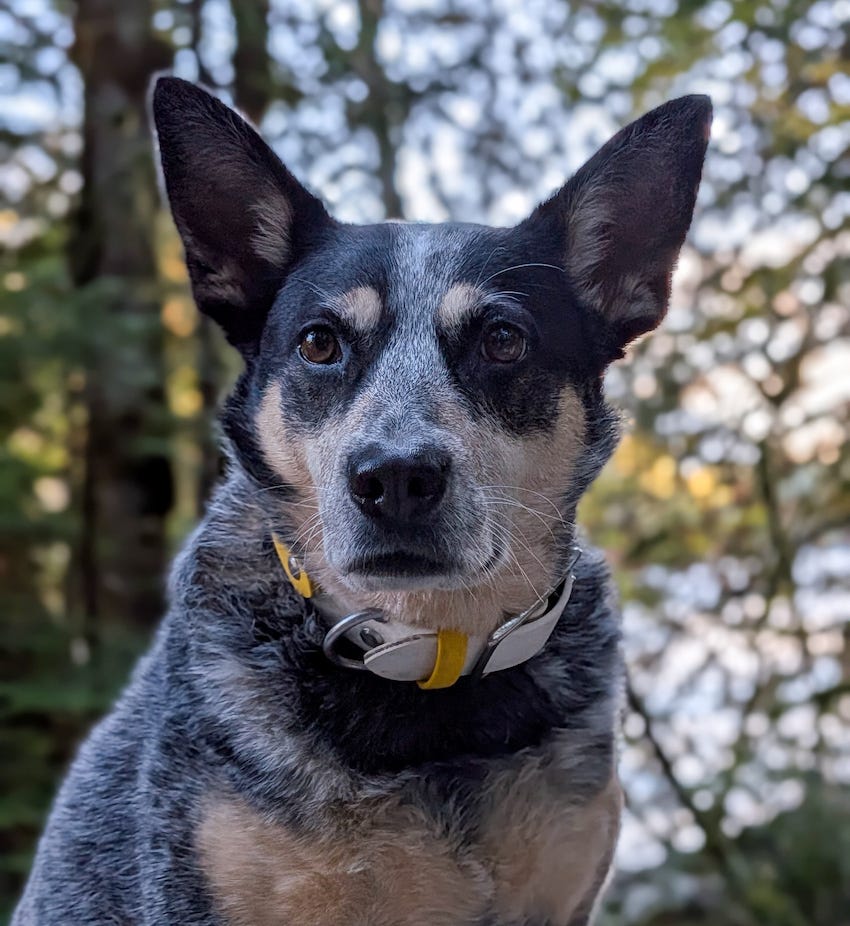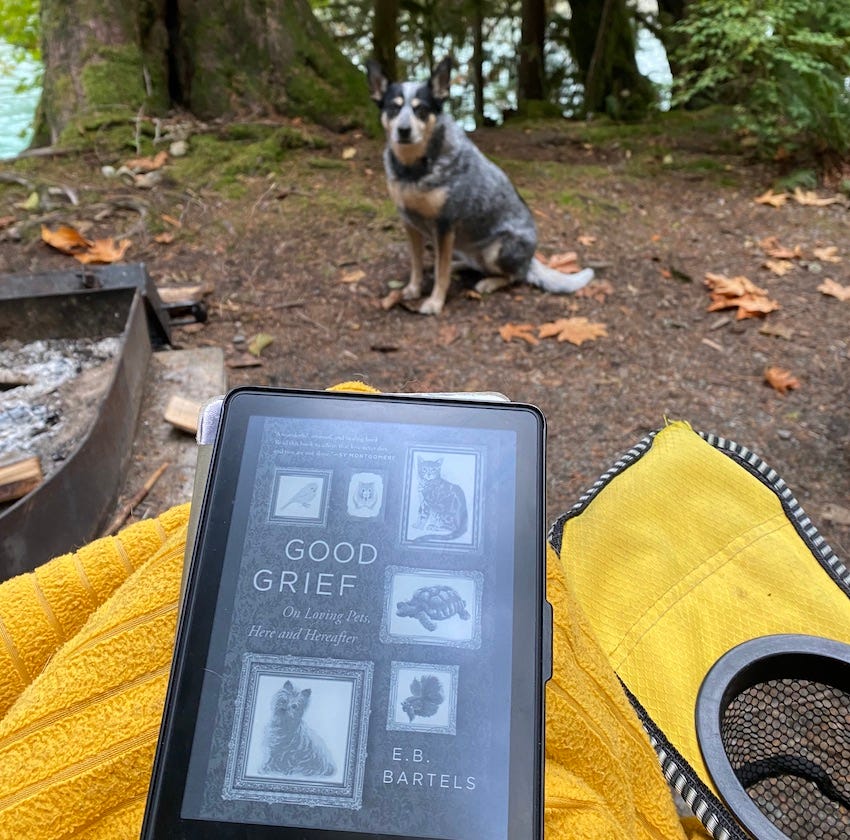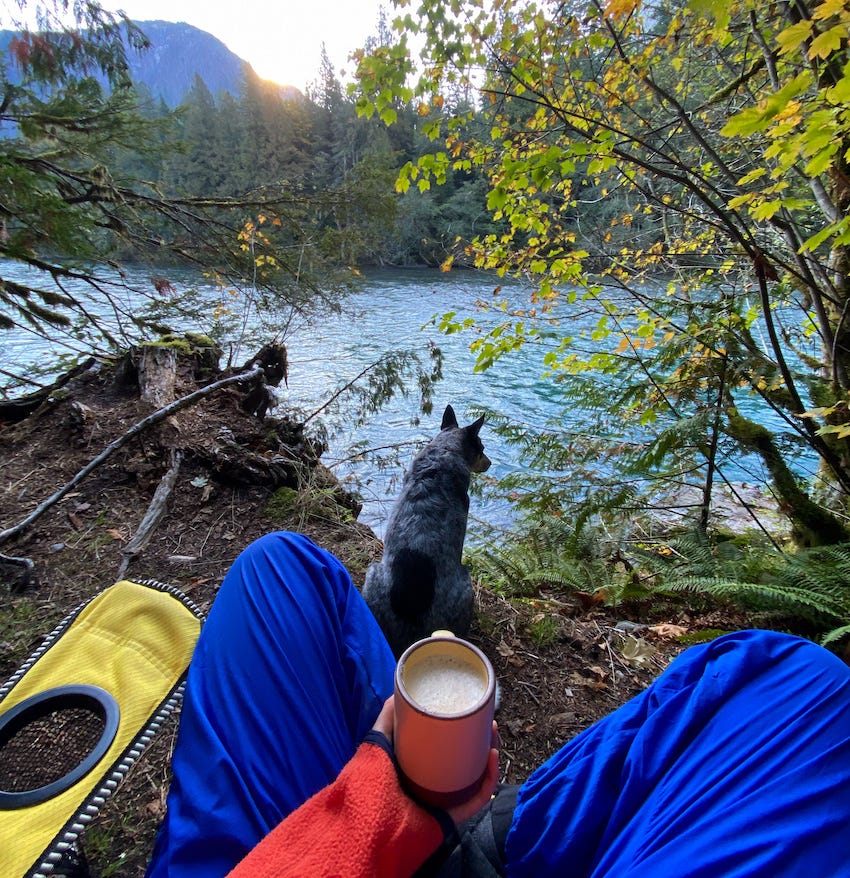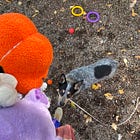I get a little closer each time I try
How much time have I wasted on adrenaline in social-media comment sections when instead I could be loving my dog right here, right now, in front of me?
Yesterday I took a photo of Scout and, for the very first time, all I could think when I saw it was “holy hell she looks so old.”
This realization is at once both surprising and obvious. I’ve been thinking (and writing) about Scout “slowing down” for years now. When she settled into her epilepsy medication plan back in 2022, a close friend gave me permission to extend her “grouchy old lady” privileges. Since the first month we moved into our van in 2023, Sean has commented that Scout “un-ages” when we camp in a particularly crisp and deserted forest spot. 2024 was a big year for pushing fewer training challenges on our cattle dog in favor of prioritizing comfort. 2025 has been much the same.
So the signs have been there for a long time: I’ve tracked them, discussed them with the people I love, posted about them publicly on the internet, answered family members’ questions about how Scout is doing with “oh, you know, she’s such an old lady now but still really happy”.
Apparently I’ve just been doing all of that without actually internalizing that she is, in fact, an old lady. My mouth forms the words. My brain understands they’re true. My heart refuses to listen.
The dissonance is astounding.
Perhaps I’ve been thinking of Scout’s senior years as an endless amorphous experience. Like, yeah, of course she’s slower than ever, and so our rules are more relaxed than ever, and we’ve settled into this lovely harmonious “final stage” of our shared life—but that shared life isn’t actually going to end, right?
Right?
(I’ll forever be waiting for someone to tell me I’m right.)
This week I’ve been revisiting Good Grief: On Loving Pets, Here and Hereafter by E.B. Bartels. I blew through the book on my first read because I wanted to finish it before I had the opportunity to hang out with E.B. in person (which was exactly as delightful as I dreamed). Now I’m taking it more slowly and intentionally, giving it more gravity. When a passage makes me cry—as many of them do—I sit with the tears instead of rushing onto the next section.
Scout almost always presses her nose against my hand when she hears my uneven breathing.
Sometimes I think I am writing my own book for Scout. The manuscript is, in so many ways, a testament to her—what she’s taught me, how she’s challenged me, why we’ve built this relationship over nearly seven years. Of course it’s for her!
But, as one of Alia Hanna Habib’s September newsletters notes, “Writing an essay collection or a memoir is an act of generosity. A common misconception is that these kinds of books are all about the author. They’re not. They’re about the reader.”
My book is inspired by Scout. (And of course the process of sitting with all these concepts—trying to distill them into something digestible and touchable and true—has done great things in our lives already.) But I can’t say I’m doing it for her, fundamentally.
I’m doing it for Current You, reading this, and for Past Me.
But I need to do different things for her.
The other day I found, in an old journal document I forgot I’d written, the following question: How much time have I wasted on adrenaline in social-media comment sections when instead I could be loving my dog right here, right now, in front of me?
To that I add: How much time have I wasted on moving the same comma and replacing it with an em dash before finally scrapping the whole sentence when instead I could be living a life worth writing about?
How much time have I wasted on the pit in my stomach—the one that first made my gut its home back in elementary school, the one that whispers always you are not good enough—when instead I could have been looking into the eyes of one creature who screams, each and every morning, that I have become the very best for her?
No: Because of her.
I will never be ready to lose Scout. I will never know quite how to think, let alone write, about her inevitable death—and about all the heartbreak I see around me in the dog world. When you base your identity in control of (and obsession with) language, it’s uncomfortable to realize how feeble words can be. One of my friends recently learned her dog has severe heart disease; another that her companion has cancer; yet another has already said goodbye. Each time I sit down to process the losses, to make them real on the page, I find myself ambling in circles.
But maybe that’s the point. The circular-ness of it all. “Grief is a process, and one that can’t be rushed,” E.B. says in the early pages of Good Grief.
Maybe I get a little closer each time I try.
Other notes and news
Welp, I have been instructed by the powers that be to hold off a little longer still on yelling about the exciting project that took up most of my July, August, and a good chunk of September. I’m basically vibrating over here!!
Buuut, also exciting: I created a “book map” to better visually track my progress turning the first draft of my dream manuscript into something I feel is ready to query. Color-coded spreadsheets are the best, end of story.
In case you missed it
I consider it one of our greatest accomplishments that Scout has expanded her idea of what constitutes a “toy”.









Oh my gosh wow Haley thanks for all the Good Grief love! I'm sorry that the book is feeling more and more relevant to you, but happy to hear it's a comfort. <3
Just ordered a copy of that book. Appreciate your words as always - you nailed it on the head. Logically we know they are aging and our time with them is so short - but emotionally, you never truly understand what that means. It’s very hard to accept - even when they are gone.